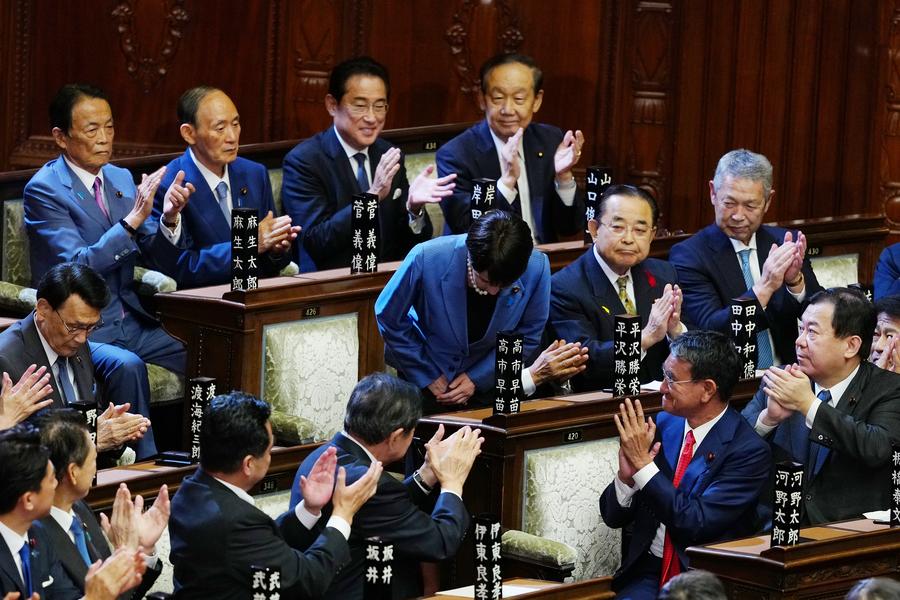


Sanae Takaichi (C) bows after winning the prime ministerial designation vote in the House of Representatives in Tokyo, Japan, Oct. 21, 2025. (Xinhua/Jia Haocheng)
As the Chinese side has emphasized, Takaichi's erroneous remarks constituted a gross interference in China's internal affairs, seriously violating the one-China principle, the spirit of the four political documents between China and Japan, and the basic norms of international relations.
TOKYO, Nov. 16 (Xinhua) -- A decade ago, the Japanese government of Shinzo Abe rammed through the deeply divisive security legislation permitting limited collective self-defense.
Such move was met with widespread public resistance and criticism for overriding the government's own 1972 constitutional interpretation, which had drawn a clear red line under Article 9 of the country's constitution: Japan could not, under its pacifist Constitution, engage in collective self-defense.
Now, Japanese Prime Minister Sanae Takaichi, a self-claimed political heir of Abe, attempts to take this already-dangerous reinterpretation and wrench it into even riskier territory for Japan and the region.
During a recent parliamentary hearing, Takaichi cited the so-called "survival-threatening situation" -- a trigger designed by the controversial 2015 law -- and linked it to the Taiwan question, suggesting Tokyo might treat the Taiwan question as grounds for military involvement under the legislation.
This is not merely reckless rhetoric. It is profoundly destabilizing. By dragging the Taiwan question into Japan's already-contested security framework, Takaichi is deliberately blurring the boundary between defensive policy and outright militaristic adventurism.
It is a reckless gambit that ignores Japan's constitutional limits, disregards public sentiment, and gambles with the security of the entire region.
The logical contortions in Takaichi's remarks are staggering. A so-called "survival-threatening situation" refers to a clear danger situation in which an armed attack on a foreign country with which Japan has close relations threatens Japan's survival. China's Taiwan is plainly not "a country" with close ties to Japan, nor does any conceivable Taiwan contingency amount to a clear threat to the survival of the Japanese state or the basic rights of its citizens.
To shoehorn Taiwan into the category of a "survival-threatening situation" is a deliberate distortion and a calculated political provocation.
As the Chinese side has emphasized, Takaichi's erroneous remarks constituted a gross interference in China's internal affairs, seriously violating the one-China principle, the spirit of the four political documents between China and Japan, and the basic norms of international relations.
Takaichi's outburst also runs counter to the political commitments Japan has repeatedly made, igniting a storm of controversy within the country.
Some voiced concern that by hyping up the notion of "a Taiwan contingency," the prime minister is blatantly provoking China, a move that brings Japan no benefit but considerable strategic risks.
Others noted that even the United States, on which Japan relies heavily for security issues, has been cautious to avoid unnecessary provocations toward China, while Japan is taking up the role of dragging the United States into confrontation. Even certain conservative figures known for their hardline stance on China lament that Takaichi's remarks severely narrow Japan's future policy options.
Takaichi's gambit comes amid an ambitious overhaul of Japan's defense posture.
Just over a month into office, she has floated proposals for dramatic defense expansion, including a substantial military budget hike, full relaxation of arms-export controls, enhanced pre-emptive strike capabilities, and accelerated revision of security documents, with the most controversial being signs of a backtrack on Japan's long-standing "three non-nuclear principles."
Taken together, the moves indicate the government's intention to shift from postwar restraint toward a more assertive, militarized posture. If that is the case, Takaichi has, in effect, ripped away the last vestiges of the veil obscuring the real trajectory of Japan's post-2015 "collective self-defense" framework.
As China has repeatedly stated, any force that dares to obstruct China's reunification is doomed to fail.
点击右上角![]() 微信好友
微信好友
 朋友圈
朋友圈

请使用浏览器分享功能进行分享
